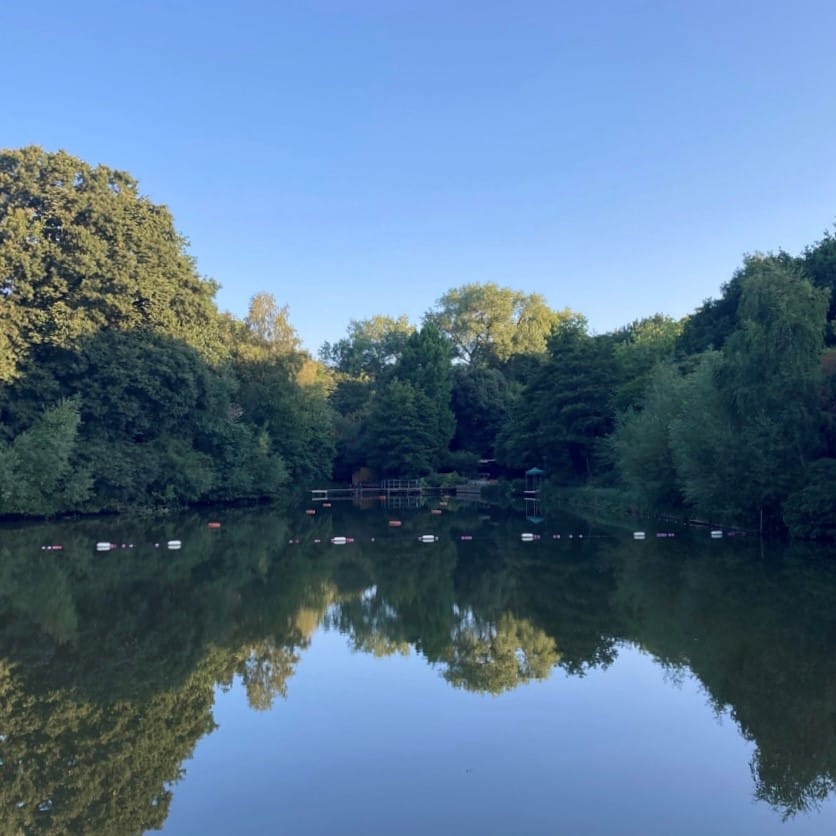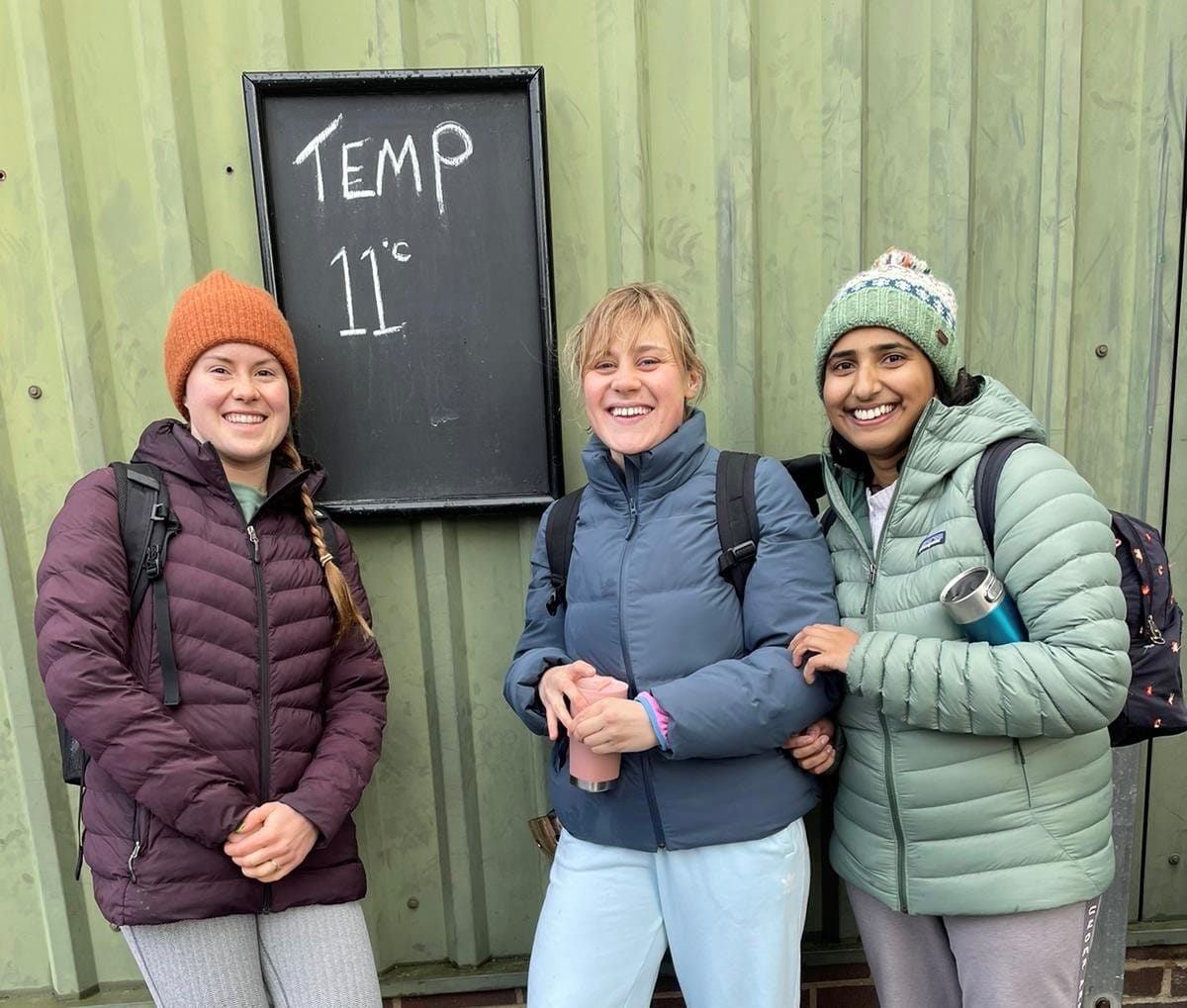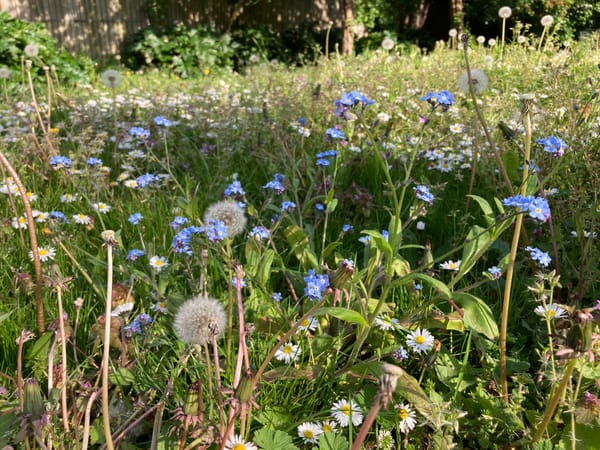Cold-water swimming at Hampstead Heath Ponds and Lido
Are the mental health benefits associated with blue spaces restricted to those who can afford to pay?

By August 2022, I was three months into my cold-water swimming obsession. I had been swimming regularly at the Mixed Pond on Hampstead Heath and, supported by the friendly lifeguards and fellow swimmers, had become hooked on the experience of immersing myself in both cold water and nature. I had spoken to several women in the changing rooms after our swims about how best to prepare for swimming in the winter. “Just keep going”, they told me, “And buy these neoprene gloves and socks, they really make a difference. Most of us don’t bother with wetsuits.”
If you make it to the colder months – like I somehow managed to – you can join the ardent winter swimmers and break into the iciest waters for a chilly dip. It’s been over a year since I started swimming on the Heath, and I’ve fallen in love with the tranquillity of the Ladies' Pond, and become fascinated by the athletic commitment of swimmers at the Lido. I even enjoyed a trip to the Men’s Pond when the Highgate Men’s Pond Association (HMPA) hosted a swim and breakfast for all open water swimmers.
Located in Zone 2 of North London, Hampstead Heath has four swimming sites: the Kenwood Ladies’ Pond, the Highgate Men’s Pond, the Mixed Pond, and a chlorinated and unheated open-air 60m swimming pool: Parliament Hill Lido. The ponds and lido are open yearround and are supervised by lifeguards, although in winter the Mixed Pond is only open to the Hampstead Heath Winter Swimming Club. These ponds are wild swimming sites, but bathing water quality is monitored weekly by the Environment Agency.
There’s something a little magical about swimming whilst a massive heron swoops over your head to land or you spot a rare kingfisher flying into the bush - not quite a chlorinated indoor pool!
Over the past year of swimming on the Heath, I have wondered what draws swimmers there and what prevents more people from going. In May 2023, I conducted an anonymous survey, circulated amongst different swimming groups and committees of the three ponds and lido. The survey was completed by 140 swimmers.
Swimmers commented on both the significance of being in nature, and the impact that cold-water swimming has on their mental health. One swimmer at the Men’s Pond said, “There’s something a little magical about swimming whilst a massive heron swoops over your head to land or you spot a rare kingfisher flying into the bush - not quite like a chlorinated indoor pool!”
Over 90% of respondents said they were motivated to swim at the ponds or Lido due to mental health benefits. I asked Alastair Campbell – previously the press secretary to former Prime Minister Tony Blair, and co-presenter of ‘The Rest is Politics’ podcast – to describe his experience of swimming at the Lido.
“I have an addictive personality and the cold-water swimming addiction is what I call a healthy one.” he said. “I got into it when I stopped enjoying running as much as I used to, and bit by bit I was really drawn into it – becoming almost like a physical and mental need to start the day. If you had said to me five years ago that I would be willing the water to get colder, I would have thought you were crazy. I remember the first time I got below 10˚C at the Lido, and I couldn’t believe I had done it… I don’t know why it helps my mental health. I just know that it does. There is also a really good crowd of regulars at 7a.m. at the Lido, and I think we feed off each other in terms of how the swimming helps us.”
There is a growing body of evidence around the health benefits of cold-water swimming. In 2022, the first feasibility study on the impact of sea swimming on depression was published in the Mental Health and Physical Activity journal and showed a reduction in the severity scores for depression and anxiety. Given emerging research and the positive experiences reported by Hampstead Heath swimmers – one of whom described swimming at the ponds as a “mental health workout”– it is concerning that access to the Heath’s cold-water swimming spaces is becoming limited by compulsory charges imposed by the City of London Corporation. Until March 2020, it was free to swim at the Hampstead Heath Ponds. Payments of £2 or £1 for adults and concessions respectively could be volunteered by those that could afford it and wished to pay. Now charges of £4.50 for adults and £2.70 for concessions are compulsory.
Jeremy Watson and Mike Smith – Treasurer and Chair respectively of the HMPA – explained that whilst the HMPA, Mixed Pond Association, and Kenwood Ladies’ Pond Association tried to rally against the charges, there was little opportunity to act as the introduction of the charges was swiftly followed by the COVID-19 lockdown.
They also explained that whilst free swimming was available to people over the age of 60 between 7:00 and 9:30 a.m., the time bracket did not coincide with the free travel for over 60s offered by Transport for London. This reduces uptake of free swimming by those who do not live within walking distance of Hampstead Heath or have access to other means of transport. When the HMPA asked the City of London Corporation to extend the free swimming for over 60s to midday, they were told there was insufficient funding to do so.
I contacted Dr Mark Harper – senior author of the aforementioned sea swimming article, consultant anaesthetist at Sussex University Hospitals, and author of the book Chill: The Cold Water Swim Cure. I asked Dr Harper to describe the benefits of cold-water swimming, and why natural resources like the blue swimming spaces on Hampstead Heath should be protected so that everyone can reap the benefits, regardless of income.
Dr Harper said, “Outdoor swimming provides a comprehensive ‘package’ of proven mental and physical health benefits, through green therapy, blue therapy, exercise, community, and the unique properties of cold temperatures. By providing free access to resources such as Hampstead Ponds, the benefits to the wellbeing of society far outweigh the income generated.”
In July 2020, the Save Our Ponds campaign was launched to call on the City of London Corporation to – according to the petition – “reverse their recent anti-democratic decision to impose compulsory charges for entry to the Hampstead Heath bathing ponds”. The petition mentions that the 1871 Hampstead Heath Act, which secures “free and open natural space for people to enjoy in perpetuity” has been “diluted if not defiled” by the City of London Corporation by charging for entry to the ponds.
Members of the HMPA committee and survey respondents emphasised that since the introduction of these charges, the demographics of people visiting the ponds have changed. One anonymous swimmer at the Ladies’ Pond and Mixed Pond said, “I’ve swum at the ponds for 25 years and through the winter for 12 years. I am saddened by the changes that have happened in the last few years - the increases in charging and subtle and not-so-subtle attempts by the Heath Management to commercialise the pond, by making it less accessible to people who really need and value it but cannot afford the entrance fee.”
The HMPA are planning to recruit a diversity officer to their committee, who will be responsible for increasing access and diversity at the Men’s Pond. However, the committee members explained that the scope of this role would be far greater if the compulsory charges were not in place. Whilst concession rates are available, the fact that many swimmers noticed a shift in the backgrounds of people coming to the ponds suggests that the concession rates are either too expensive, or that many who cannot afford the full fee are ineligible for the concession fee.
The Hampstead Heath swimming community feels very inclusive. One swimmer at the Ladies’ Pond said, “There are few places where women gather in community and it feels important to have spaces like that.” A member of the Hampstead Heath Winter Swimming Club said, “Winter Swimming Club at the Mixed Pond creates a fantastic community. It is straightforward to join and needs to be protected.” However, a swimmer at the Men’s Pond said, “I have swum in the Men’s Pond for nearly 30 years and the whole experience has been adversely affected by the changes brought in since COVID, including mandatory charging. It is a real pity that others will not be attracted to the Pond by open access and the previous quirkiness, including naked sunbathing.”

At the end of May this year, the City of London Corporation banned naked sunbathing at the Men’s Pond. In the Camden New Journal, Dan Carrier described that the tradition of naked sunbathing dates back over 100 years. One anonymous swimmer stated that naked sunbathing at the Men’s Pond is of “national importance to LGBTQ+ history”. There is concern amongst swimmers that the invoking of such rules and compulsory charges will make the ponds less inclusive over time.
The City of London Corporation were asked to explain why compulsory charges are in place, why free swimming for over 60s is only available between 7:00 and 9:30a.m., and why naked sunbathing has been banned at the Men’s Pond after almost a century. They refused to provide a response.
Overall, it seems that the compulsory charges of swimming at the ponds and lido are reducing access of these sites for many people who might benefit from cold-water swimming. For the ponds in particular, which are natural resources described by many as a source of mental health support, more work needs to be done to ensure that access to these blue spaces is available to people from many different backgrounds. Despite the financial obstacles imposed by the City of London Corporation, which are unlikely to change, the volunteerled pond associations are determined to find other approaches to increase access to these historical swimming sites.









